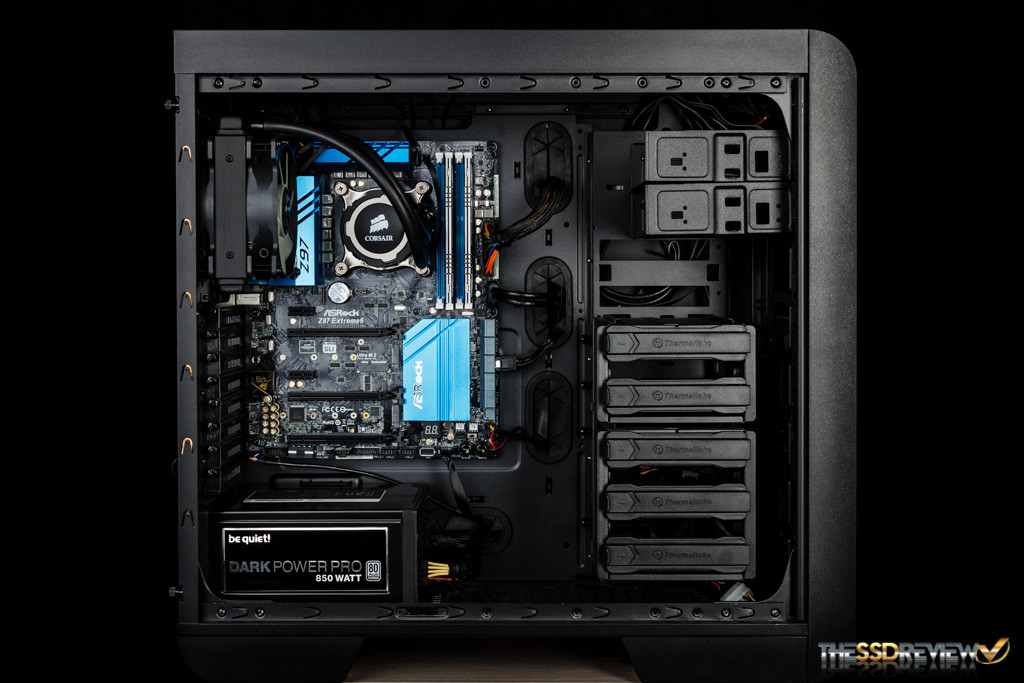TSSDR TEST BENCH AND PROTOCOL
SSD testing at TSSDR differs slightly, depending on whether we are looking at consumer or enterprise SSDs. For consumer SSDs, our goal is to test in a system that has been optimized with our SSD Optimization Guide. To see the best performance possible the CPU C states have been disabled, C1E support has been disabled, Enhanced Intel SpeedStep Technology (EIST) has been disabled. Benchmarks for consumer testing are also benchmarks with a fresh drive so, not only can we verify that manufacturer specifications are in line but also, so the consumer can replicate our tests to confirm that they have an SSD that is top-notch. We even provide links to most of the benchmarks used in the report.
SYSTEM COMPONENTS
This Test Bench build was the result of some great relationships and purchase; our appreciation goes to those who jumped in specifically to help the cause. Key contributors to this build are our friends at ASRock for the motherboard and CPU and be quiet! for the PSU and cooling fans. Also, a big thank you to Thermaltake for the case and Kingston for the RAM. We have detailed all components in the table below and they are all linked should you wish to make a duplicate of our system as so many seem to do, or check out the price of any single component. As always, we appreciate your support in any purchase through our links!
| PC CHASSIS: | Thermaltake Core V51 |
| MOTHERBOARD: | ASRock Z97 Extreme6 |
| CPU: | Intel Core i5-4670K |
| CPU COOLER: | Corsair H75 |
| POWER SUPPLY: | be quiet! Dark Power Pro 10 850W |
| SYSTEM COOLING: | be quiet! Silent Wings 2 |
| MEMORY: | Kingston HyperX Beast 2400Mhz |
| STORAGE: | Samsung 850 Pro |
| IRST DRIVER: | 13.1.0.1058 |
BENCHMARK SOFTWARE
The software in use for today’s analysis is typical of many of our reviews and consists of Crystal Disk Info, TRIMcheck, ATTO Disk Benchmark, Crystal Disk Mark, AS SSD, Anvil’s Storage Utilities, PCMark Vantage, and PCMark 8. We prefer to test with easily accessible software that the consumer can obtain, and in many cases, we even provide links. Our selection of software allows each to build on the last and to provide validation to results already obtained.
Crystal Disk Info is a great tool for displaying the characteristics and health of storage devices. It displays everything from temperatures, to the number of hours the device has been powered, and even to the extent of informing you of the firmware of the device.
 Crystal Disk Info shows us that on top of TRIM and NCQ, the XPG SX930 also supports DevSleep. There is also a working temperature sensor and a bunch of other helpful S.M.A.R.T. attributes.
Crystal Disk Info shows us that on top of TRIM and NCQ, the XPG SX930 also supports DevSleep. There is also a working temperature sensor and a bunch of other helpful S.M.A.R.T. attributes.
We’ve covered TRIMcheck in the past. It is a great tool that easily lets us see if TRIM is actually functioning on a SSD volume in your system.
 After a quick test we can see that TRIM is working.
After a quick test we can see that TRIM is working.
ATTO Disk Benchmark is perhaps one of the oldest benchmarks going and is definitely the main staple for manufacturer performance specifications. ATTO uses RAW or compressible data and, for our benchmarks, we use a set length of 256mb and test both the read and write performance of various transfer sizes ranging from 0.5 to 8192kb. Manufacturers prefer this method of testing as it deals with raw (compressible) data rather than random (includes incompressible data) which, although more realistic, results in lower performance results.
120GB
Taking our first look at performance with ATTO we can see that the 120GB and 240GB models perform nearly identically reaching up to 556MB/s read and 460MB/s write, in line with specifications. The 480GB model reaches up to 544MB/s read and 430MB/s write as expected as well.
 The SSD Review The Worlds Dedicated SSD Education and Review Resource |
The SSD Review The Worlds Dedicated SSD Education and Review Resource | 

I would like to buy an SSD for the operating system.
I am thinking over this one
https://hardware.nl/adata/asp600s3-64gm-c.html
But maybe it is better yo purchase more storage? Here is another one
https://www.amazon.com/ADATA-SX900-SandForce-Synchronous-ASX900S3-256GM-C/dp/B007M7XS94
Windows 7 demands 20 GB of space. So 64GB SSD should be enough, but I am not sure.
While Windows can take around 20-30GB I would still suggest purchasing at least a 120GB drive due to programs and personal files taking more space. Right now, however, it makes more sense to buy a 256GB model because of the price to capacity value.
I have a 256Gb Pro Samsung SSD and it’s okay for now. In the beginning I got 500+ Mb/s but it’s down to 200/300 Mb/s and the i/o speed has dropped a hundred points in the first 6 months. It’s not as fast as it was and it’s barely going on a year old.
This is for me what would you suggest hold data and transfer when needed to a sata drive some thing that has good read write capabilities can withstand a bit of punishment
i copy customers data and get rid of viruses etc from said drives and got customers pc coming in whos ssds is full of viruses etc so i have set up new one and get the data of the old one a lot of work ps thankyou for any help you can give me